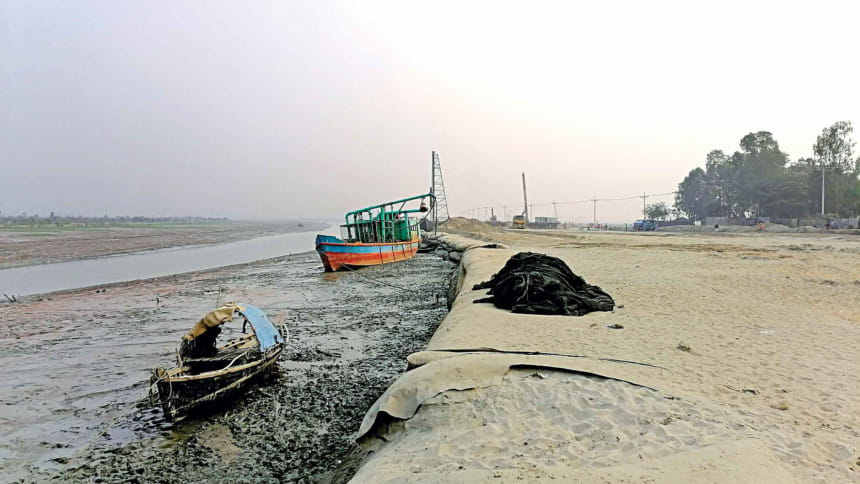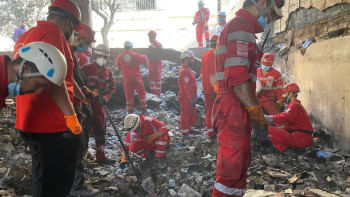The killing of Kohelia

One fine morning in 2015, fisherman Mohon Jolodas woke up to the roar of dump trucks close to his home, adjacent to Kohelia river in Matarbari union of Moheshkhali.
To his utter surprise, the truck started dumping sand into the river -- the source of his community's livelihoods.
These last five years, Mohon has watched the once-vibrant river die in front of his very eyes.
The seasoned fisherman said the 12-kilometre-long river was his main source of income. He used to earn Tk 700-Tk 1,000 by fishing, a daily wage enough to maintain his four-member family.
"The dumping did not stop for a single day since 2015, encroaching around 2km of the water body to make a road so that the authorities could easily move with their vehicles to and from the power plant," Mohon told The Daily Star earlier this month.
He was referring to the 1.2-gigawatt coal-fired power plant being constructed by Coal Power Generation Company (CPGC) in Matarbari on 1,400 acres of land.
The under-construction 13km four-lane road starts from Rajghat bridge point of Kohelia and leads right up to the confluence of the river, where the power plant is being built.
On a visit to the Rajghat bridge area of Matarbari on January 11, this correspondent saw dozens of dump trucks, excavators and cranes engaged in filling up the river under supervision of CPGC engineers.
Large geotextile bags filled with dredged sand are being put down and large iron sheets were seen being installed for the road.
Around 2km of the river have been engulfed completely. The mangrove forest along the river bank has also been destroyed for the road, locals said.
Interestingly, the sand used for filling up the water body itself comes from the river's east point. Large dredgers were seen extracting sand which was being carried by the truck to dump at the west side of the river for the road construction. As a result, the river has narrowed significantly.
Huge shoals emerged from the river as road construction reduced water flow from the sea, Mohon said.
Many commercial and non-mechanised fishing boats were seen stuck on the shoal of the river.
No wooden fishing boats, mechanised or non-mechanised, or vessels carrying salt -- produced in the area -- can currently navigate the river, thanks to the road construction and river filling.
"The road to the power plant not only destroyed the river but also our livelihood, hopes, and future. Now I eke out a living on daily labour," an aggrieved Mohon said.
The Kohelia river emanates from Ujantia union of Pekua upazila and ends up in the Bay of Bengal, crisscrossing 12km through many villages such as Mohon's.
Abul Bashar Parvej, convener of the Committee to Protect Kohelia River, told The Daily Star that the river was a local heritage for Moheshkhali.
The river once facilitated easy communications with other parts of Cox's Bazar and Chattogram as traders used to carry their goods in boats -- salt traders in particular used to ship their produce via the Kohelia.
"It is now on its deathbed owing to this road being built."
"More than 2,000 fishermen from three unions including Dholghat, Matarbari and Kalarmarchhara lost their livelihoods. Many of them are now migrating to shipbreaking yards in Chattogram in search of work," he said.
"We protested, organising human chains to stop such mindless activities, but in vain."
Project Director Shyamal Kumar Bhattacharya, also additional chief engineer of the Roads and Highways department, told The Daily Star that they got clearance from the Department of Environment (DoE) for the road construction.
The project includes the building of a 13km road from Badarkhali to the Matarbari power plant, 7.4km of which will be along the Kohelia river, he said.
"We are doing minimum encroachment and it is not a full-fledged river. It is a canal which dries up during low tide," he said.
Safkat Hasan, manager of the project, claimed that they had their clearance issued by DoE, renewed it each year, and had the environmental impact assessment (EIA) and feasibility study approved by the DoE.
Deputy director of DoE Cox's Bazar office Nazmul Huda told The Daily Star that the project authorities had obtained clearance from DoE (in 2014) and that they had renewed it.
"But the problem is they did not mention anything about encroaching the river. Had they mentioned it, DoE would not have issued any clearance. We will move as per the law," he said.
Sharmeen Soneya Murshid, a member of National River Conservation Committee, who visited the Kohelia river on January 20, told The Daily Star that the way the Roads and Highways Department filled up the road is "a criminal act" against the river.
"The DoE must be held responsible if they issued any clearance for the project," she said, adding that RHD embarked on the road construction violating existing environmental law.
"RHD brought a change in the design after it was approved by DoE. The RHD authorities did not feel it necessary to have their renewed design approved from DoE again," Murshid said.
General secretary of Bangladesh Poribesh Andolon (Bapa) Sharif Jamil told The Daily Star that while the government is on a campaign to reclaim river land, an entire river is being filled up -- setting a massive contradiction between policy and action.
"Why does the Roads and Highways Department have to fill up a river mile after mile? How dare they destroy the river -- its rich biodiversity and the livelihoods of hundreds who live off of fishing in the river?"
He raised these questions, adding that the grabbers know very well they will have to face no punishment for this.
At a protest programme at the Dhaka Reporters Unity office in Segunbagicha on Saturday, the National River Alliance and Bapa demanded the government stop sand filling and road construction by the Kohelia river.

 For all latest news, follow The Daily Star's Google News channel.
For all latest news, follow The Daily Star's Google News channel. 



Comments